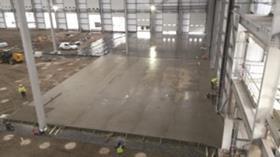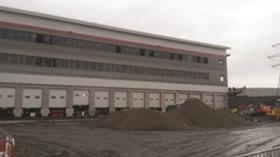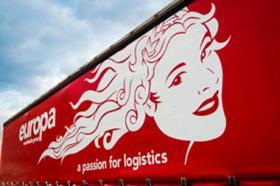At the first sight of Europa, according to the Greek myth, Zeus was instantly overcome by her beauty and grace. She’s been a popular woman ever since, inspiring the name of a continent, a moon of Jupiter and now the face of one of the fastest changing operators in the UK.
Back in August 2013 Andrew Baxter, managing director, Europa, bought a 90% stake in the firm. It’s now on the verge of being completely unrecognisable when compared to the entity he acquired. The face-lift to the livery is an obvious starting point (“Europa means intelligent and open-minded,” he tells Motortransport.co.uk, “The business has changed a lot and we want the external perception to reflect that.”) but it is not the be-all and end-all. There are significant changes afoot at the international haulage, logistics and freight-forwarding specialist.
One not so small change is the 262,500ft² new DC, with a capacity for 27,000 pallets, on the southern bank of the Thames under the shadow of the Queen Elizabeth II bridge. MT was given the full tour of the site, still under construction, and it is a significant improvement on its existing cramped site in Erith. Baxter describes Dartford as it as “pretty awesome” and while it is not yet in operation, the sheer scope and scale of the site, alongside its pristine location makes it hard to argue at this juncture.

Before making the move into Dartford (scheduled for late-April/ early-May) the internal reorganisation at Europa has been taking place at pace. “From a road freight perspective we took the decision to centralise the operational management of the business,” Baxter says.
“The way the road freight business works is we have two hubs, one in Erith and one in Birmingham. And we have six branches in the North trunking into Birmingham and five branches in the south trunking into Erith. That meant we had two operations and two administrations. We took the decision to centralise into Erith. That meant that the people in Erith had a total picture of the freight moving in the UK that we have. With two different departments you do not do things in the most efficient way. It is like running two different businesses.”
Baxter says that centralising in Erith did cause complications. Europa had to make a lot of improvements here in Erith, putting in 20 new warehouse operatives in order to handle the additional volumes the Erith site is now carrying. However, extra volumes in a compact site have not been without complication. Simply, it is running out of capacity (temporarily, until the Dartford move is made, of course) and Baxter concedes that the business has had to, again temporarily, handle freight in a very inefficient way.
“We have worked out a way to do it orderly, but it is inefficient,” he says. “There have been moments in the past year where we have struggled with the volumes we have had, that situation is not the case now. We were concerned about the fact we were struggling in August and September but we have put in a lot of process and resource and it is now OK.”

While Baxter bought his stake in the business in August 2013, part of the agreement with the original owners was that the business would continue to be run in the same way up until the end of 2013. Therefore all the changes have happened in 15 months.
“Firstly we restructured the sales organisation. We now have a sales and customer service organisation with 100 people in in. We had lots of different people in lots of different roles up and down the country, with different salary structures and different sales incentives, reporting through to different directors. What we did was create a national organisation, with a sales director who has responsibility for all of that. We put in three regional managers,(north, south, Midlands) and we recruited where there weren’t branch managers in place. Then we created a structured account manager role, a person who is a single point of contact for the customer. Around 30 road freight account managers have gone into our sales structure,” he explains.
That was not all: “We opened up two branches. One in Leeds and one in Nottingham. We were not covering 100% of the UK, but now we are. This is important from a domestic transport point of view because it means we have our own infrastructure across the whole of the country, not part of the country. And it means we get more balance in terms of exports and imports.”
Significant growth
Baxter describes the year-on-year consignment growth at Europa as “vey significant”. He says that in some months the business has had up to 37% more UK paid export shipments than it did in the corresponding month a year ago. This, of course, leads to turnover growth and market share growth – Baxter’s stated aim from the onset of taking the controlling stake.
Not that the road has run smooth: the logistics side of the business was under pressure in 2014, Baxter reveals.
“We have a [logistics] site in Erith, a site in Northampton and a site in Birmingham. Northampton and Eirth reported to a guy in Erith, and Birmingham reported to a guy in Birmingham. We have now separated that off. It has its own logistics director, sales team and sales manager. So if someone wants to talk to us about logistics, they speak to someone who knows about logistics. That is a much more professional structure going forward.
“We had a contract in Birmingham for Nintendo, where we were storing a huge value of their stock. They too the decision to centralise their European stock and that caused us a problem, because we lost a very large chuck of business and we had to go and find some new business. Then we had a change of management there that we instigated there, and we now have a new manager there. We had some difficulties, frankly, and we now have a new manager who is excellent and we have filled that building back up. But for a period last year it was not OK. We have dealt with it and it is now OK.”
Restructuring has also come in its air and ocean business, where customers were previously handled by those dealing in road freight. In Baxter’s opinion that approach doesn’t work. As a result Europa relocated its airfreight business to a site in Heathrow, and its ocean freight to its site in Birmingham.
“That means that if you have some sea freight, you speak to someone who knows about sea freight, and the same for air freight, and the same for road freight. Doing this, we kept broadly all of the business, and making these changes you create some risk in that. But we would not have made proper progress if we did not do that. We also have a separate director responsible for that business,” he says.
Developing technology

Europa has also been implementing track and trace technology throughout the business and is currently in the process of developing it with its European partner network. Baxter says that Europa now has a “proper” domestic track and trace system across the UK and which gives the business visibility with what is happening with every consignment.
“It is absolutely not simple to do that, particularly when integrating with all other suppliers,” Baxter insists. “We have put in barcoding, which we did not have before. We have put in something called LeoLoader, which is an electronic manifest – where as we had paper before – which they view on a ruggedized iPad. All the information on the manifest is live and it gives that traceability of freight. Barcode scanning is pretty standard, but non-use of paper manifests is not so standard.”
On the software Europa employs a team of software developers writing a programme called Leonardo. While the nature of the software, and the competitive advantage it will bring, are naturally being kept under wraps Baxter describes it as “mega, mega, mega”.
“You cannot buy that kind of IT over the shelf and it will deliver significant operational benefits for us when it is launched in 2016,” he says.
All this investment comes at a cost. Baxter concedes that financial year 2014 will see a very large chunk of the profitability of the business removed. He also reveals that Europa will be behind budget, but because the business has done more things than it budgeted to do. He says that this level of investment is not by accident, but by design. His approach is to deal with every issue with the approach of “what is the long-term right thing to do”.
“What we are doing is digging up everything, finding everything that is wrong and making it right. It is making the business copper-bottomed and bullet-proof, a robust organisation that delivers a very high level of quality at a very competitive level of cost. By doing that we can deliver better value to our customers. In order to do that you have to make sure that all the component bits are right.
“The speed of change is significant,” he says. “It is absolutely the case that if you walk around this business and ask anyone, certainly at a management level, they would say this business is doing really well, we are making progress and the things we are doing are right. People know that the business is being transformed.”













